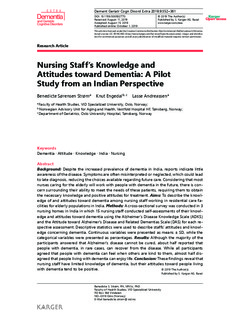| dc.description.abstract | Background: Despite the increased prevalence of dementia in India, reports indicate little awareness of the disease. Symptoms are often misinterpreted or neglected, which could lead to late diagnosis, reducing the choices available regarding future care. Considering that most nurses caring for the elderly will work with people with dementia in the future, there is concern surrounding their ability to meet the needs of these patients, requiring them to obtain the necessary knowledge and positive attitudes for treatment. Aims: To describe the knowledge of and attitudes toward dementia among nursing staff working in residential care facilities for elderly populations in India. Methods: A cross-sectional survey was conducted in 3 nursing homes in India in which 15 nursing staff conducted self-assessments of their knowledge and attitudes toward dementia using the Alzheimer’s Disease Knowledge Scale (ADKS) and the Attitude toward Alzheimer’s Disease and Related Dementias Scale (DAS) for each respective assessment. Descriptive statistics were used to describe staffs’ attitudes and knowledge concerning dementia. Continuous variables were presented as means ± SD, while the categorical variables were presented as percentages. Results: Although the majority of the participants answered that Alzheimer’s disease cannot be cured, about half reported that people with dementia, in rare cases, can recover from the disease. While all participants agreed that people with dementia can feel when others are kind to them, almost half disagreed that people living with dementia can enjoy life. Conclusion: These findings reveal that nursing staff have limited knowledge of dementia, but their attitudes toward people living with dementia tend to be positive. | nb_NO |
